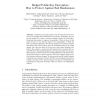Free Online Productivity Tools
i2Speak
i2Symbol
i2OCR
iTex2Img
iWeb2Print
iWeb2Shot
i2Type
iPdf2Split
iPdf2Merge
i2Bopomofo
i2Arabic
i2Style
i2Image
i2PDF
iLatex2Rtf
Sci2ools
ASIACRYPT
2009
Springer
2009
Springer
Hedged Public-Key Encryption: How to Protect against Bad Randomness
Abstract. Public-key encryption schemes rely for their IND-CPA security on per-message fresh randomness. In practice, randomness may be of poor quality for a variety of reasons, leading to failure of the schemes. Expecting the systems to improve is unrealistic. What we show in this paper is that we can, instead, improve the cryptography to offset the lack of possible randomness. We provide public-key encryption schemes that achieve IND-CPA security when the randomness they use is of high quality, but, when the latter is not the case, rather than breaking completely, they achieve a weaker but still useful notion of security that we call IND-CDA. This hedged public-key encryption provides the best possible security guarantees in the face of bad randomness. We provide simple RO-based ways to make in-practice IND-CPA schemes hedge secure with minimal software changes. We also provide non-RO model schemes relying on lossy trapdoor functions (LTDFs) and techniques from deterministic encrypti...
ASIACRYPT 2009 | Cryptology | IND-CPA Security | Per-message Fresh Randomness | Public-key Encryption Schemes |
| Added | 30 Aug 2010 |
| Updated | 30 Aug 2010 |
| Type | Conference |
| Year | 2009 |
| Where | ASIACRYPT |
| Authors | Mihir Bellare, Zvika Brakerski, Moni Naor, Thomas Ristenpart, Gil Segev, Hovav Shacham, Scott Yilek |
Comments (0)

